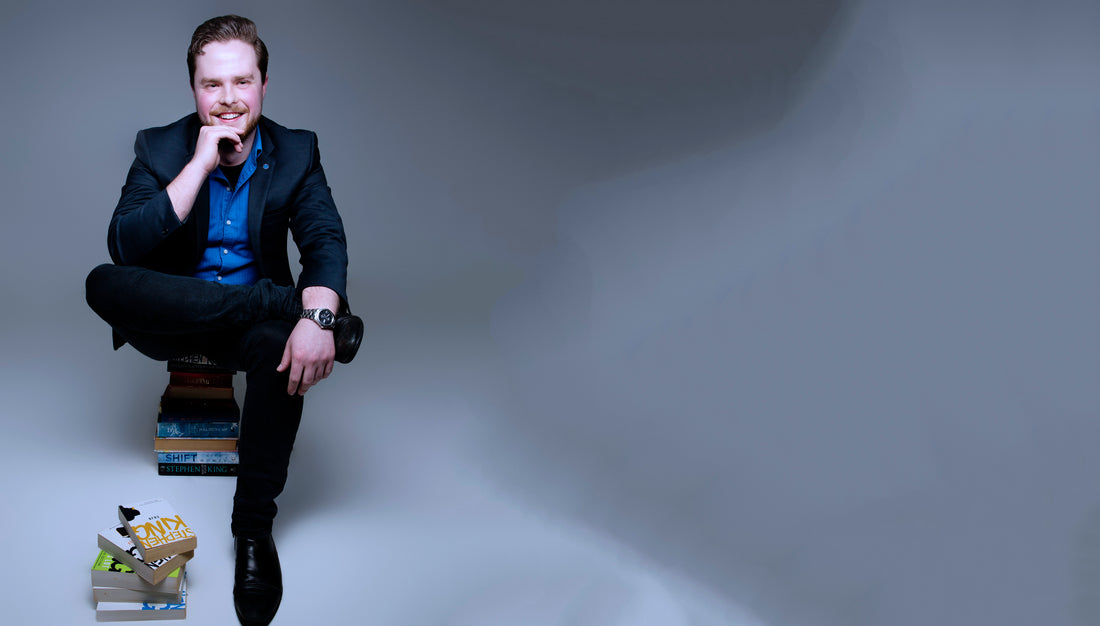We sat down to speak with David about his book. He's invited us to his studio/writing space/office - it's a converted garage on the back of the lot with lots of uplighting, computer screens, microphones, and bookshelves.
When we arrive, The Whitlams (an Australian band who made it big in the early 2000's in Melbourne) are playing quietly from speakers we can't see and David is staring at three monitors, working on a script.
The space is neat and tidy, but the string lights and curtained walls feel homey.
He's clearly somewhere else when we arrive - he looks at the screen intently, hand on chin, but sparks to life as he notices us.
After introductions, we sit in the big, comfortable armchairs, and he perches on the edge of a chair at a table designed for podcasting.
Q: So, last time we spoke the book had just come out. Now it's out there, what's changed?
I mean, people have read it now. Which is kind of crazy, you know? I got an email the other week from someone who had just finished for a second time and they live in Portugal.
Which is wild to hear someone liked enough to go back for a second helping. But it's really cool to hear that sort of thing.
Q: That is very cool. Do you think about that a lot - people reading your work, I mean?
Yeah I guess so - because we make Art For Artists* weekly a big part of that show is looking at different ways to read media. Most of what I do for that podcast - or what I bring to it, I guess, is that I make connections between things. So we'll be talking about a movie, and I'll say to myself "oh yeah, I can see how this is touching on The Real a little, I wonder if I can bring Lacan into the discussion." And whether or not I end up going that way, I'm thinking about that every week.
So it's kind of interesting when it's your own work. Because sure, people listen to our podcast every week, but it's sort of different when it's a single, completed work divorced from you as an entertainer.
That's more vulnerable.
Q: Has anyone's response to the book surprised you then?
Maybe not surprised, exactly? The coolest thing is when someone gets it, you know?
Q: What do you mean?
Well, when they write a review or they send me a message and they've noticed the pacing or they go back through, and once they know the twist, they can see all the set up that was there all the while. The other day an old friend who I started making youtube content with got in touch and said he loved the book - that meant a whole lot.
I'm mostly grateful when someone takes the time for a reading, and they see what I was trying to do.
Q: For me, I was struck by how subtly visual the book is. It sounds simple, but it's definitely related to the pacing. It seems like you were really careful with the description to make sure there was just enough and didn't slow things down, especially at the start of the book on Carthage - how did that come about?
That stuff all comes from a lot of hard work. Which I know is super cliche but that's it. After the structural edits I spent a really long time refining the voice to make sure Maynard's voice was present throughout the story, then I paired it back a little.
When you're younger - or for me at least - I thought less linguistically - it was more semiotic and interpretative.
So having the story from Maynard's perspective had this challenge where it was all about balancing between providing enough description to make the world feel real and interesting, and not so much that you read it and go "no kid would describe an awning on a house as squalid."
But then I studied contemporary literature, so the Tolkien-esque thing of describing every possible detail isn't my style.
And especially in the edits, I was able to explain that to Aron so he really helped make sure that was happening.
Q: You mention Aron a lot when people ask about the story, is that just a function of your author/editor relationship?
I mean it could be, but also most creative projects I've done in my life are less like burning the midnight oil alone, and more like taking a bunch of people I like on a boat down some dangerous rapids - it's all still my ideas and me in charge, but you can't really do it alone.
Q: A big theme of the story is about isolation - Maynard spends a lot of the book trying to find people to trust. Is that focus a result of your experience then?
One of the tricks with writing younger characters is trying to tap into how people think they used to think - it's not enough to capture what it felt like to be fourteen, you kind of have to inhabit people's expectations of reading someone's experience at that age.
And most of my work ends up being about isolation and connection in some way. Some more explicit than others.
There's a running joke in our content that I'm a fan of stories with "Sad Dads," and that's sort of related, where, even now, I find connecting and relating to other people either super easy or super difficult. It's either instant and lasts forever for me, or it's just an anxiety nightmare.
Q: Do you relate to Maynard then?
Actually, I think I gravitate more toward Abbey and Vanderbilt. They're both adults trying to survive. There's something tragic about them that I love as well - they're both kind of bound by their beliefs, and while Abbey is highly competent and disconnected, Vanderbilt is so intensely connected he can't be competent.
So as much as that is an obvious reading to say "oh it's just the author self-inserting" Maynard and I are really different, and maybe that says something about me in and of itself. So, no, not really.
Q: That seems to go hand in hand with asking about inspiration - was there one of those "aha" inspiration moments for the book?
I've just been working on the world for so long. We're working on the second one now, well into the edits, and I had one of those moments last week where things just clicked, but I'm not sure I can remember one from book one.
I know for sure that there's a specific scene in the book that I wrote from start to finish and we changed maybe five words? It was toward the end of the edit, and we needed it rewritten, and I was just tuned in to what we were doing - plugged in or whatever. And it just super worked first time, so that sort of counts.
Q: Can you tell us what it was without spoiling the story?
It's the story within a story that we get - that aside where we learn about the world a little and the main antagonistic force - the story about Deverill.
Q: There's a decent amount of subtext in the story about politics and lying and stealing, and without naming names, the politicians in the story feel uncomfortably real - do you mistrust politics in that way, or is it just a product of the story?
I wouldn't say I don't trust politicians - I served on the Youth Electorate for my local politician. I just don't trust anyone who says they have it all figured out. When someone has a galvanised worldview that they don't budge from I just get really defensive - like, that can't be healthy?
One of the coolest things about life is learning new stuff as you go, and there's a whole group of politicians and leaders who just pretend they have it all stitched up. And I've always been wary of that, so when I was thinking about this world - and Veilmakers** especially, I wanted to communicate how convincing and sinister it can be when you're on the receiving end of that.
You have these people who all think they're the good guys doing anything they can to get to what they think is the right outcome. And then here's Maynard, a kid just trying to get by, who becomes sort of engulfed by all this ambition and conspiracy. Because that's what it felt like when I was growing up. There's like, a moment, where the curtain is pulled back and you see just how complicated and messed up the world is, and that there's no easy fix for anything.
And I guess as a result Maynard has to face that reality. He doesn't get an easy option to solve his problems, right - he's offered the choice we all are: do you take the path of least resistance or do you try to do what you think is the right thing.
He doesn't really end the story with an answer, because I don't have one. And I don't think anyone really has an answer - people who say they do are either ignorant or lying.
Q: It does feel like a story where children are treated the way it feels to be treated when you're young - a lot of characters dismiss Maynard until they need him - is that a reflection of what you see?
Absolutely. They're super smart and super switched on. They [kids] notice more than they can express, and we constantly treat young people poorly.
Q: Okay, so what's next for book two then?
Without spoiling anything... we're still in the structural editing stage, but it's an exploration of who Maynard has become at the end of this story, and how he might fit into the world now that he's leveled out a little.
We end the story with our crew on the way to The Crucible, and book two is all about that journey. It's a little more cerebral, but I think, as we work through it now, it's going to be very different from the first, but in the right way.
Regardless, it's an exploration of Maynard going from a thief into a Detector - or something like it. I'm excited to see where we end up.
*Art For Artists is a podcast David runs where each week they examine something from pop culture, and David does a deep dive of research to understand what makes the thing work, and what creators can learn from it.
**Veilmakers are a composite politician and conspirator in the Maynard Trigg world.

